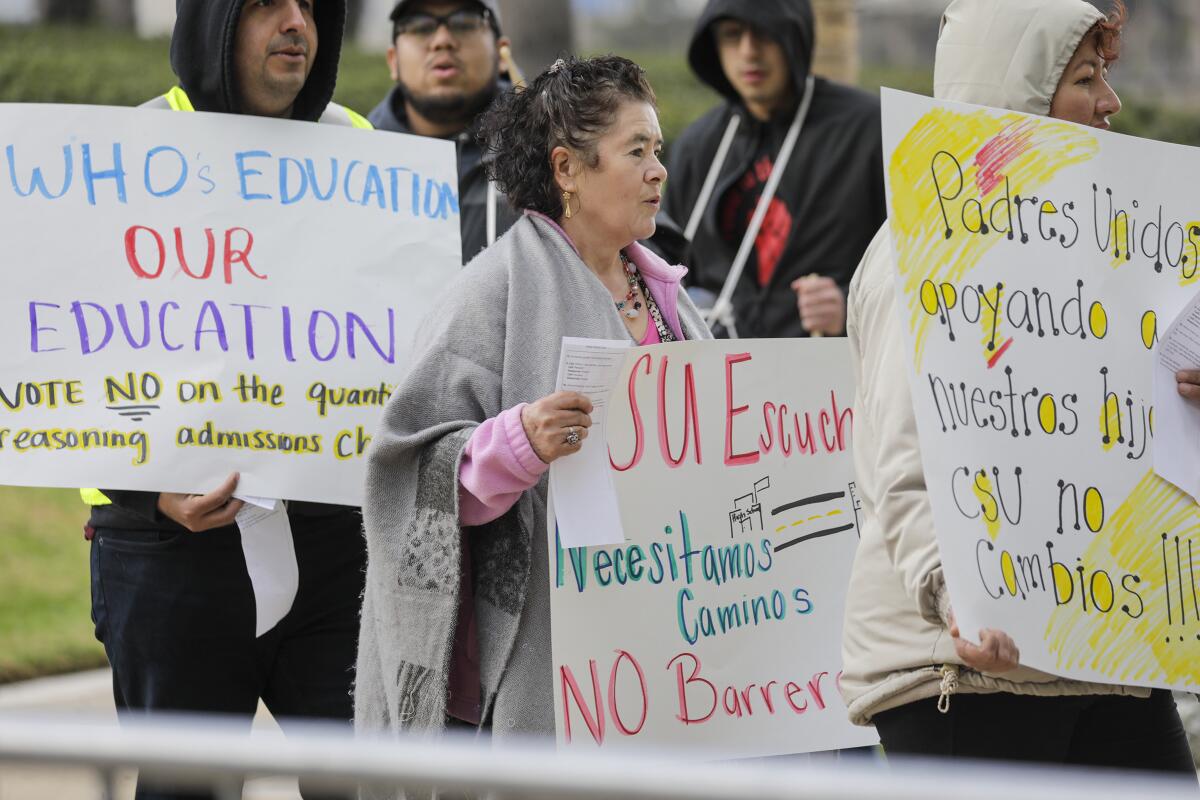Cal State math proposal would create an unfair barrier for black and Latino students, critics say

- Share via
A controversial Cal State University proposal to require a fourth year of math-related coursework for admission came under robust questioning and at times harsh criticism Wednesday from top state educators and others who said it would unfairly block black and Latino students from the system with no guarantee that it would improve graduation rates.
More than 90 social justice groups, education organizations, and school district and legislative leaders from across the state have voiced their opposition to the plan, first proposed in 2016 and enthusiastically embraced by CSU Chancellor Timothy P. White as a way to raise standards and graduation rates, close achievement equity gaps and better prepare California’s future workforce.
In the fifth board hearing this year on the issue, tensions surfaced in testimony. The proposal calls for CSU admits to take an additional year of math, science or other quantitative coursework, such as computer science or personal finance. At the heart of the debate are questions about educational access for the hundreds of thousands of students who apply to and attend the nation’s largest public four-year university system.
“What is it that you found in research that shows that this course, more than anything else — that this course is the secret sauce that will improve graduation and retention rates for the students that we say we seek to serve?” asked State Supt. of Public Instruction Tony Thurmond, an ex-officio member of the board.
Groups including the California Faculty Assn., California Teachers Assn., black and Latino legislative caucuses, and the Los Angeles Unified school board have opposed the change, arguing that it would disproportionately harm black and Latino students and those from low-income families because of disparities in access to such classes and the lack of qualified teachers.
Some critics rallied outside the trustees’ meeting Wednesday, banging drums and chanting, “Hey hey, ho ho, admissions change has got to go.”
Their opposition has continued even after the proposal was revised in recent weeks to delay implementation by one year, to 2027, and to automate the process to exempt students who would be unable to meet the requirement because their schools lack the necessary courses.
“The concerns remain the same,” said Michele Siqueiros, president of the Campaign for College Opportunity. “We have a teacher shortage in math and science today. That’s not going to be resolved in six years, or seven. We already have inequitable opportunity for [course] completion based on race, based on income.”
Siqueiros and others also said there is not enough data specifically linking one additional year of quantitative reasoning coursework to improved graduation rates.
According to CSU’s analysis, 93% of admitted students already meet the proposed requirement. Of students meeting it, 24% graduate within four years. Of students not meeting the requirement, 15% graduate in four years.
“These numbers simply do not add up. They do not create a foundation for such a dramatic change,” said Lt. Gov. Eleni Kounalakis, an ex-officio member of the board.
“This would only make a very small, marginal difference in the 4-year or 6-year graduation rates but could have tremendous implications for the signal that we’re sending to our kids about who we’re really welcoming,” Kounalakis said.
James Minor, CSU assistant vice chancellor, has repeatedly said that lack of a causal link is not a reason to reject the proposal, which he said raises the standards for all students and enables more to participate in STEM majors, science, technology, engineering and math.
“That level of standard or evidence just doesn’t exist in post-secondary education,” Minor, a former deputy assistant secretary at the U.S. Department of Education, said.
“True equity is what somebody does after they graduate [in] their professional lives,” White said of the proposal in September. “To me, getting more people entering the field that they’re interested in is a much higher order of equity than simply, can you get in the front door?”
The CSU academic senate recommended the change and reaffirmed its support for it in a resolution last week.
However critics on Wednesday called for more analysis.
Elisha Smith Arrillaga, executive director of Education Trust-West, a nonprofit research group focused on educational equity, said she wants the CSU to identify schools and districts that would be disparately affected, create a plan in collaboration with the California Department of Education to minimize those impacts, and consider alternatives before taking up this policy.
Trustees are scheduled to vote on the proposal in January.
More to Read
Sign up for Essential California
The most important California stories and recommendations in your inbox every morning.
You may occasionally receive promotional content from the Los Angeles Times.











